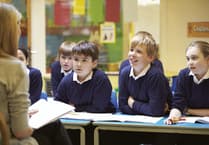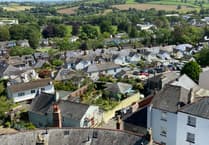DARTMOUTH is sitting on a social time bomb of poverty and deprivation, it is feared.
Community campaigner Dawn Shepherd says children are often the victims as many families struggle to cope at winter time, with less employment and higher fuel bills.
And Dartmouth and District Food Bank says it regularly sees families who are ‘just about managing’.
The warnings came after findings released by the charity End Child Poverty showed that nearly a quarter of children in Dartmouth are living in poverty – figures county and district counillor Jonathan Hawkins described as ‘shocking’.
The figures, calculated by the Centre for Research in Social Policy, break down the estimated levels of child poverty before and after housing costs in each of the wards in the South Hams.
They show Dartmouth Townstal as having 13.88 per cent of children in poverty before housing costs and 22.69 per cent after. Dartmouth and Kingswear has 9.58 per cent before, and 15.51 after. Rates in the same area after housing costs include Skerries – 12.21 per cent – and West Dart –20.92 per cent.
Dawn, who earlier this year launched the Community Chest furniture bank, covering Dartmouth and the surrounding area, said: ‘We often go into houses where children are playing in coats, gloves and scarves. Many families are having to choose between food and heating.
‘We live in a town of seasonal employment and in some cases people are having to work hard for peanuts simply to survive.
‘Children are more vulnerable to colds and tummy upsets. It’s a ticking time bomb of adults with long-term health and social problems.’
Anna Brownlow, of Dartmouth Food Bank, said: ‘We know there are a tremendous amount of families with children who are having a tough time.
‘They are just about managing but if anything goes wrong they have no buffer.
‘Sometimes problems associated with benefits or housing support can take weeks to sort and we at the food bank have to be there to see them over that difficult period.’
Anna said the food bank would remain open every Wednesday at the Ivy Lane centre over the Christmas period. ‘Poverty is a very private thing and we never turn anybody away,’ she said.
Meanwhile, Dawn has started her annual collection of new or good quality second hand toys for Christmas to help those families in need.
‘Whatever the reason people can’t afford Christmas, the kids don’t go without,’ she said.
Organisers of this year’s St Saviour’s Church Advent Fair have already given a number of donated soft toys that will be made up into presents.
Donations of toys can be dropped off at Dawn’s stall in the Old Market on a Tuesdays and Fridays, or contact her on 07496 349234 or at dartmouth [email protected].
Dani de Beaumont, children’s services manager for Action for Children, said the figures on poverty were an excellent reality check.
‘As the children’s centre service for the whole of the South Hams, we are aware of these pockets of deprivation and that, for instance in Townstal, pretty much all of the families with children under five years of age are registered with us and we are reaching them through our universal offer and our one-to-one work,’ she said.
‘I hope this publication will trigger some useful discussions, especially because the benefit cap will kick in this month.’
Dartmouth Caring manager and co-ordinator Nick Hindmarsh, the former principal of Dartmouth Academy, said: ‘These figures do not surprise me.
‘In my role, I can confirm that many of the clients’ issues we see are associated with povert – and across the age spectrum.
‘We see more poverty among the elderly than in families but there is no doubt that this report reflects what many of our community experience.’
Dartmouth district and county councillor Jonathan Hawkins said he found the figures ‘shocking’.
‘That is why it is so important that we do all we can to make our area attractive to employers who will pay a decent wage.’ he said.
‘House prices are frightening and South Hams District Council needs to work harder to ensure we have houses and homes that are affordable or at a sensible rent.’
District and country councillor Julian Brazil, from Stokenham, said: ‘These figures seem extraordinarily high but this is a symptom of our low-wage economy in the South Hams, paired with house prices that are so expensive.
‘This is a result of our unbalanced society and we have to to do something about it.
‘Poverty is an emotive word and I hope that children in this area have a good quality of life – we have great schools and outside areas.’
Kingsbridge district and county councillor Rufus Gilbert said he was equally shocked by the figures, although somewhat sceptical as to how they were compiled.
‘I have to say that the children I see going to school or in the parks and shops don’t seem too badly off,’ he said.
‘Although, I’m sure, some parents are finding times very challenging indeed and I’m personally very concerned for those families.’
Dr Sarah Wollaston MP said: ‘These figures set out the scale to which high housing costs in the South Hams impact on disposable incomes for local families. This is an area which I have raised with the housing minister Gavin Barwell MP and I have invited him to visit to hear directly from campaigners on affordable housing.‘Solutions that work for inner cities will be different to those for rural areas where land values make it so difficult to build genuinely affordable housing. I was glad to hear the announcement in the budget on affordable housing but would like to see funding available for affordable housing in rural communities.‘It is also interesting that the courts have upheld the changes brought in by St Ives to try to control the levels of second home ownership through a principle residency requirement. It will be interesting to see if other neighbourhood plans adopt this approach but this is for local people to decide.’Nationally, 3.5 million children are currently living in poverty, with the density being as high as 47 per cent in some areas, particularly large urban centres.
Sam Royston, chairman of the End Child Poverty Coalition, said: ‘As the Prime Minister has rightly recognised, this is not a country that works for everyone. In every community, there are children being denied the happy childhoods and the good start in life other children take for granted. Our children are twice as likely to be poor as our pensioners.
‘Families who are just about managing today, won’t be managing tomorrow if Universal Credit leaves them with fewer pounds in their pocket and if inflation means the pounds in their pocket don’t stretch as far as they used to.
‘We urge the Chancellor to reverse the significant cuts to Universal Credit targeted at working families and, at the very least, shield children’s benefits from inflation.’
In the findings, ‘poverty’ is defined as 60 per cent or less of the median household income in the UK, which is £23,556 with two adults. So this is a household income of less than £14,133.
The Living Wage Foundation has set the Living Wage – the wage needed to live in the UK outside of London – at £8.45 an hour, or £17,576 a year. Two adults earning the Living Wage would have a household income of £35,152 a year.
The findings also come as social workers are urging local authorities to support improvements for children and families by putting more resources into the sector to help with caseloads and supervision.
The public service union Unison recently carried out a survey of 2,858 frontline social workers to gauge their views on the Children and Social Work Bill currently being debated in Parliament.
The result shows there is little support for the reforms, with the vast majority of social workers believing that the key proposal, to grant local authorities the power to exempt themselves from children’s social care legislation, will lead to more children being placed at risk.
The facts, figures, calculations and an interactive map are on the End Child Poverty website https://www.endchild+poverty.org.uk




